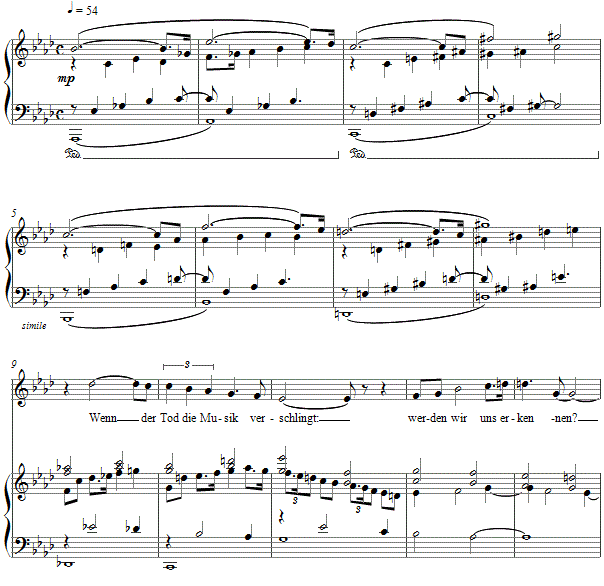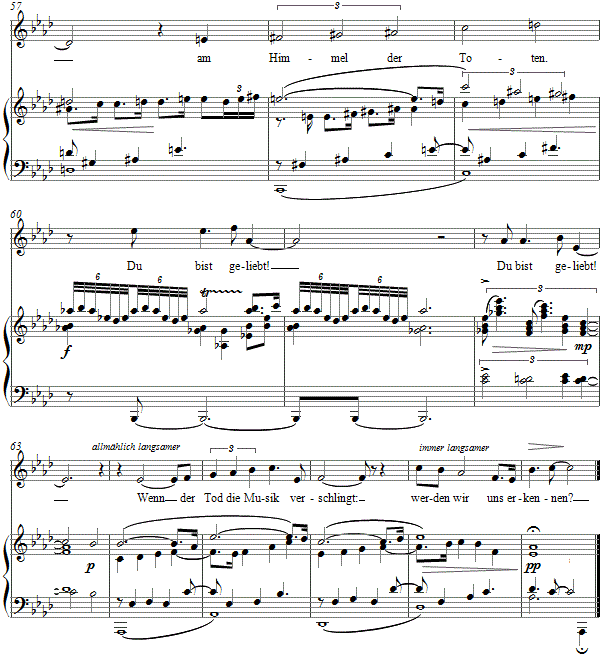Music and Texts of GARY BACHLUND
Vocal Music | Piano | Organ | Chamber Music | Orchestral | Articles and Commentary | Poems and Stories | Miscellany | FAQs
Gedichte - (2011)
Walter Hasenclever
for medium voice and piano
Wenn der Tod
Die Musik verschlingt:
Werden wir uns erkennen?
Lebst Du
Im Zimmer, wo Männer stehn?
Aus dem Meer steigt die Insel,
Ein Leben, das uns gegolten hat.
Vögel fliegen auf.
Weine nicht!
*
Mond.
Gazellen rufen;
Die Öde der Täler, bedeckt von Schnee.
Sieh, ich wandle,
Ein Mensch der Liebe.
Ein Herz voll Hoffnung
Hat mich erreicht.
*
Wo bist du?
Ein Stern fällt.
Dein Gesicht!
Du bist da!
*
Wenn Du den Becher leerst,
Wo jenseits
Weiße Schwalben trinken:
Vergiß nicht die Träne,
Den Kuß, den Du träumtest,
Am Himmel der Toten.
Du bist geliebt![ 4 pages, circa 5' 15" ]
Walter Hasenclever
Walter Hasenclever (1890-1940) was a German Expressionist writer, who first studied law at Oxford, moved on to the University of Lausanne, then Leipzig. His first collection, Städte, Nächte und Menschen, was published in 1910, and thereafter he worked in plays and even a time on contract for Garbo screenplays for MGM. A contemporary of many European expressionist artists, his works were banned when the National Socialists came to power in 1930, and he fled to France where he imprisoned twice as a "foreign enemy" in France, and when the Nazis conquered the south of France, he took his own life rather than fall into their hands.
The text is taken from the 1920 Ernst Rowohlt anthology, Menschenheitsdämmerung, in which he is in the good company of a number of seminal writers from the time.
When death
devours music:
will we recognize ourselves?
Do you live
In a room, where men are to be found?
In the ocean rises an island,
A life, that validates us.
Birds fly up.
Weep not!
Moon.
Gazelles call;
Desolate valleys covered in snow.
See, I wander,
A being of love.
A hope-filled heart
Has arisen in me.
Where are you?A star falls.
Your face!
You are there!
When you empty the cup,Where shall
White swallows sip:
Forget not the tears,
The kiss, that you dreamed,
In death's heaven.
You are beloved!
gb
The lyricism of the opening spans long gestures as an introduction to the shifting harmonies, from diatonic to whole tone and back again. As the tonality settles, the D flat seems as if the "arrived at" tonic of the piece but only temporarily.
The repetition of the assertion, "Du bist geliebt," is followed by a reprise of the opening stanza's lingering question as the final cadence arrives at the A flat tonic heretofore evaded.
The score for Gedichte is available as a free PDF download, though any major commercial performance or recording of the work is prohibited without prior arrangement with the composer. Click on the graphic below for this piano-vocal score.


